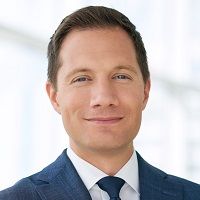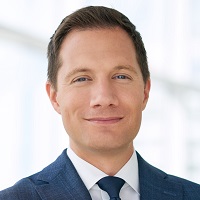Now's a Great Time to Become a Financial Adviser: Here's Why
There's a growing need for financial advisers. Why not take on a role that offers earning potential and work-life balance and helps change lives?


Profit and prosper with the best of Kiplinger's advice on investing, taxes, retirement, personal finance and much more. Delivered daily. Enter your email in the box and click Sign Me Up.
You are now subscribed
Your newsletter sign-up was successful
Want to add more newsletters?

Delivered daily
Kiplinger Today
Profit and prosper with the best of Kiplinger's advice on investing, taxes, retirement, personal finance and much more delivered daily. Smart money moves start here.

Sent five days a week
Kiplinger A Step Ahead
Get practical help to make better financial decisions in your everyday life, from spending to savings on top deals.

Delivered daily
Kiplinger Closing Bell
Get today's biggest financial and investing headlines delivered to your inbox every day the U.S. stock market is open.

Sent twice a week
Kiplinger Adviser Intel
Financial pros across the country share best practices and fresh tactics to preserve and grow your wealth.

Delivered weekly
Kiplinger Tax Tips
Trim your federal and state tax bills with practical tax-planning and tax-cutting strategies.

Sent twice a week
Kiplinger Retirement Tips
Your twice-a-week guide to planning and enjoying a financially secure and richly rewarding retirement

Sent bimonthly.
Kiplinger Adviser Angle
Insights for advisers, wealth managers and other financial professionals.

Sent twice a week
Kiplinger Investing Weekly
Your twice-a-week roundup of promising stocks, funds, companies and industries you should consider, ones you should avoid, and why.

Sent weekly for six weeks
Kiplinger Invest for Retirement
Your step-by-step six-part series on how to invest for retirement, from devising a successful strategy to exactly which investments to choose.
This year is poised to move fast — and not in the way you might think. Dreams of professional mobility are making many people wonder about climbing a new career ladder.
According to Gallup, the proportion of Americans seeking new job opportunities is the highest it’s been in the last decade. Meanwhile, people’s satisfaction with their current employer is at a record low.
Moreover, employees’ expectations for their employers are rising. Today’s talent is looking for better compensation and recognition, work-life balance and development opportunities in roles that make a difference.
From just $107.88 $24.99 for Kiplinger Personal Finance
Become a smarter, better informed investor. Subscribe from just $107.88 $24.99, plus get up to 4 Special Issues

Sign up for Kiplinger’s Free Newsletters
Profit and prosper with the best of expert advice on investing, taxes, retirement, personal finance and more - straight to your e-mail.
Profit and prosper with the best of expert advice - straight to your e-mail.
Those trends are tailwinds for the financial adviser profession, where we expect to see thousands of new entrants in 2025.
Making an impact
Financial advisers help people identify their blind spots and protect what matters most: their families, their ability to retire comfortably and the goals that define their purpose. In 2024, 64% of Americans who worked with a financial adviser said they felt financially secure compared to a mere 29% without an adviser.
Moreover, 75% of Americans who worked with a financial adviser said they’ll be prepared for retirement compared to 45% of those without one. People with a financial adviser also expect to retire two years earlier with double the retirement savings of those who don’t work with one.
Interested in more information for financial professionals? Sign up for Kiplinger’s new twice-monthly free newsletter, Adviser Angle.
This is a career where professionals can meet people where they are, help positively change the trajectory of their lives and build a plan for the creation of intergenerational wealth.
Our advisers are there for families when they are needed the most — helping ensure loved ones can come together in difficult moments and grieve, knowing their finances are in order. And while that opportunity for impact is enough for many mission-driven individuals, there’s more.
Work-life independence
While other professions may require set hours, advisers have control over how they work and who they choose to work with. It’s an opportunity to help others live their best life — and for talented advisers to start living their best life, too.
Financial advisers have the freedom to own their own business and organize their own career. But unlike other entrepreneurial roles, they never have to feel like they are by themselves. Supportive team members and experienced advisers are always lending a hand and offering guidance.
Potential for income and equity
Most Americans believe when they work harder and deliver stronger results, they should earn more money. But for many salaried employees, that connection between effort and rewards isn’t always clear.
On the other hand, for financial advisers, hard work pays off — literally. If they help more Americans build financial security, they build more value for themselves. Our most successful advisers build generational wealth for themselves and for their families.
This earning potential is especially attractive for people who are successful in their current roles but feel like they’re reaching the top in their current careers and want to push higher.
In my role at Northwestern Mutual, I’ve met successful advisers from a wide variety of backgrounds: from accountants and lawyers to teachers, nurses, electrical engineers, athletes and even actors.
Through ample training and mentorship opportunities, countless career-changers have been able to break through ceilings and reach higher in a new profession that’s ripe with opportunity.
Growing need for financial guidance
More than 100 million Americans are uninsured or underinsured. The gap between Americans’ retirement goals and savings continues to grow. And 30% of U.S. adults say they feel financially insecure.
Meanwhile, America’s financial adviser population is aging — and many see retirement on the horizon. The average age of financial advisers today is 56, with 44% of advisers over 55 and only 10% under 35. According to a Cerulli report, 37% are expected to retire this decade.
To put more Americans on the path to financial security, the industry must grow the number of advisers who can make a positive, sustainable difference in people’s financial lives and meet the needs of the marketplace for comprehensive financial planning.
We are doing our part at Northwestern Mutual, by setting a goal to recruit more than 5,000 financial representative and intern candidates — from not only across the country, but across industries.
By continuing to recruit and train talented individuals who bring their own unique set of skills, perspectives and expertise to the table, we as an industry can better serve clients and help them reach their financial goals.
Related Content
- How Savvy Is Your Financial Adviser? Three Ways to Find Out
- How Financial Advisers Can Build Retiring Clients' Confidence
- Ready for a Career Checkup? Five Steps to Plan What’s Next
- Over 50? You’re a Hot Ticket in Today’s Labor Market
- Ready for a Career Change? Consider Nonprofit Work
Profit and prosper with the best of Kiplinger's advice on investing, taxes, retirement, personal finance and much more. Delivered daily. Enter your email in the box and click Sign Me Up.

John Roberts is Executive Vice President and Chief Field Officer at Northwestern Mutual, where he leads the organization responsible for the growth of the company’s exclusive field force of advisers and teams. John also oversees the company’s growing $335 billion wealth and investment management company. John’s leadership and passion for the long-term success of Northwestern Mutual’s advisers has led to significant investments in growing the company’s next generation of leaders, making the company’s field leadership roles the best entrepreneurial opportunity in America.
-
 Nasdaq Leads a Rocky Risk-On Rally: Stock Market Today
Nasdaq Leads a Rocky Risk-On Rally: Stock Market TodayAnother worrying bout of late-session weakness couldn't take down the main equity indexes on Wednesday.
-
 Quiz: Do You Know How to Avoid the "Medigap Trap?"
Quiz: Do You Know How to Avoid the "Medigap Trap?"Quiz Test your basic knowledge of the "Medigap Trap" in our quick quiz.
-
 5 Top Tax-Efficient Mutual Funds for Smarter Investing
5 Top Tax-Efficient Mutual Funds for Smarter InvestingMutual funds are many things, but "tax-friendly" usually isn't one of them. These are the exceptions.
-
 Nasdaq Leads a Rocky Risk-On Rally: Stock Market Today
Nasdaq Leads a Rocky Risk-On Rally: Stock Market TodayAnother worrying bout of late-session weakness couldn't take down the main equity indexes on Wednesday.
-
 Quiz: Do You Know How to Avoid the 'Medigap Trap?'
Quiz: Do You Know How to Avoid the 'Medigap Trap?'Quiz Test your basic knowledge of the "Medigap Trap" in our quick quiz.
-
 5 Top Tax-Efficient Mutual Funds for Smarter Investing
5 Top Tax-Efficient Mutual Funds for Smarter InvestingMutual funds are many things, but "tax-friendly" usually isn't one of them. These are the exceptions.
-
 Why Invest In Mutual Funds When ETFs Exist?
Why Invest In Mutual Funds When ETFs Exist?Exchange-traded funds are cheaper, more tax-efficient and more flexible. But don't put mutual funds out to pasture quite yet.
-
 We Retired at 62 With $6.1 Million. My Wife Wants to Make Large Donations, but I Want to Travel and Buy a Lake House.
We Retired at 62 With $6.1 Million. My Wife Wants to Make Large Donations, but I Want to Travel and Buy a Lake House.We are 62 and finally retired after decades of hard work. I see the lakehouse as an investment in our happiness.
-
 Social Security Break-Even Math Is Helpful, But Don't Let It Dictate When You'll File
Social Security Break-Even Math Is Helpful, But Don't Let It Dictate When You'll FileYour Social Security break-even age tells you how long you'd need to live for delaying to pay off, but shouldn't be the sole basis for deciding when to claim.
-
 I'm an Opportunity Zone Pro: This Is How to Deliver Roth-Like Tax-Free Growth (Without Contribution Limits)
I'm an Opportunity Zone Pro: This Is How to Deliver Roth-Like Tax-Free Growth (Without Contribution Limits)Investors who combine Roth IRAs, the gold standard of tax-free savings, with qualified opportunity funds could enjoy decades of tax-free growth.
-
 One of the Most Powerful Wealth-Building Moves a Woman Can Make: A Midcareer Pivot
One of the Most Powerful Wealth-Building Moves a Woman Can Make: A Midcareer PivotIf it feels like you can't sustain what you're doing for the next 20 years, it's time for an honest look at what's draining you and what energizes you.